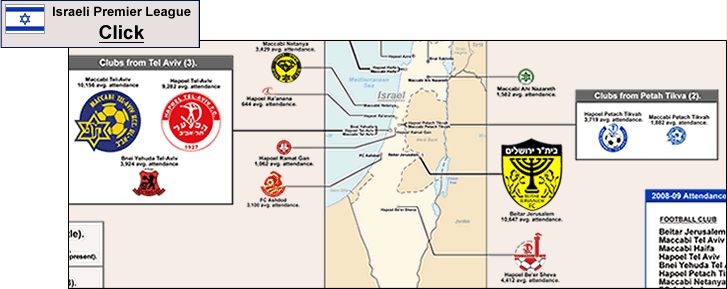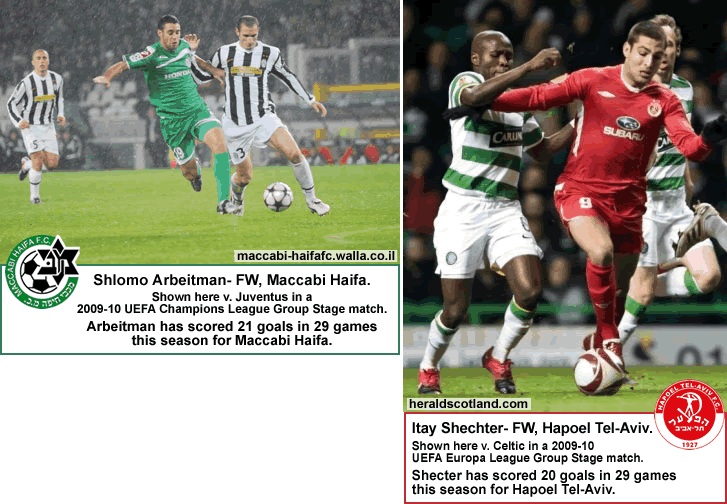
Currently, Israel is ranked #20 by UEFA, for European league competitions (for 2011-12). That’s up from #22.
Here are brief explanations of the large amounts of football clubs in Israel with Maccabi or Hapoel in their names…Maccabi, here: ‘What is Maccabi GB?’. “…Maccabi was founded at the turn of the century in Central and Eastern Europe. Following rising anti-Semitism, Jews were excluded from local sports and social clubs. So they decided to form their own. …”
[From Wikipedia:]…Hapoel is an Israeli sports association. It was established as a union of the Histadrut of the workers in the land of Israel. Histadrut, here: Histadrut. “…founded in 1920 in Haifa as a Jewish trade union…”
Most Maccabi football clubs in Israel have that star-of-David-with-Hebrew-letters device as part of their logo, while most Hapoel football clubs in Israel have that quasi-Bolshevik-style-worker-with-sickle-and-hammer device in their logos. And most Hapoel clubs feature red in their color scheme, so you can see the original left-wing base of the Hapoel clubs. Israel football clubs are supposed to have shed themselves of official political affiliations, but it remains that Hapoel clubs are decidedly more left-wing. The biggest bastion of the right-wing in football in Israel remains Beitar Jerusalem. You are apt to see a plethora of Likud Party faithful at Beitar Jerusalem home matches, and literally zero Palestinians and Arabs. In fact (no surprise, they being so far right-wing) there is a significant amount of racist Beitar Jerusalem fans {see this, ‘Bigoted Israeli Soccer Fans Walk Out After Muslim Player Scores For Their Team‘ (deadspin.com, from 3 Mar.2012)}. The biggest bastion of the left-wing in football in Israel remains Hapeol Tel-Aviv. You are apt to see Che Guevara banners at Hapoel Tel-Aviv home matches.
-
The 2009-10 season in the Israeli Premier League is the first with the expanded size of 16 teams, up from 12 teams. Also new this season is the playoffs system, which sees the league split into 3 separate round-robin competitions after the 30-match regular season is finished. The 30th round is the weekend of 10-11 April.
On the upper left-hand corner of the map page, I have briefly outlined the playoff system, and I will talk about it at the end of this post.
Also on the map page is an all-time titles list for Israeli clubs. The most successful club in Israel is Maccabi Tel-Aviv, who have won 20 titles, but none since 2003. Second are Hapoel Tel-Aviv, with 12 titles, but none since 2000. [Tel Aviv is Israel's largest city, with a metropolitan area population of 3.25 million {2009 figure}.]
The third most-titled club in Israel are Maccabi Haifa, with 11 titles, including 2009. Fourth are Beitar Jerusalem, who won their 6th title in 2008. Not coincidentally, these four clubs are also the highest-drawing clubs in Israel, pulling in 9,000 to 10,000 or so per game. The league as a whole averaged 5,305 per game last season, but with the expanded size of the league, cumulative average attendance has gone down over 1,000 per game this season. This is because two of the just “promoted” clubs draw crowds that number only in the hundreds (Hapoel Acre 2000, and Hapoel Ra’anana). 2009-10 attendance figures, here… Israel 2010 attendances (E-F-S site).
-
Reigning champions Maccabi Haifa are from Haifa, which is the third-largest cityi n Israel, with a metropolitan area population of 1.04 million {2007 figure}. Maccabi Haifa was a small club overshadowed by local rivals Hapoel Haifa, until the 1980s, when Maccbi Haifa started winning titles. The Yerukim, or Greens, won their first title in 1984. The club became known for their flashy offensive style, but with a sometimes porous defense. By the 1990s, with new ownership, the club became stable financially. In 1994, the club won it’s fifth title, but then faltered in the following seasons, as the club lost key players (like Eyal Berkovic) to Western European clubs. 2000 saw the arrival of Avram Grant, the former Maccabi Tel-Aviv manager who had won titles there in Tel Aviv in 1991 and 1995. Grant helped Maccabi Haifa regain it’s dominating offensive style. Standout player was attacking midfielder Yossi Benayoun, who went on to tally 55 goals (many of which were spectacular) in 130 games for the Greens. Maccabi Haifa won the 2000 and 2001 titles, and became the first club from Israel to qualify for the UEFA Champins League Group Stage (for the 2002-03 CL season). The subsequent departure in the summer of 2002 of Grant, for the Israel national team coaching job (Grant now manages Portsmouth), and of Benayoun, for Racing Santander in Spain’s La Liga (Benayoun is now at Liverpool), contributed to the club’s failure to win three straight titles. But Maccabi Haifa did in fact achieve that three-in-a-row feat in the following seasons, winning the Israeli title in 2004, 2005, and 2006. This was under manager Ronny Levy, who was an early proponent of the use of computer software for player evaluations and for tactics. Ronny Levy now manages recent Romanian champions and CL Group Stage qualifier Unirea Urziceni (of Romania). Maccabi Haifa are currently managed by Elisha Levy (no relation), who had captained the squad in the 1982-83 season.
-
Elisha Levy has Maccabi Haifa comfortably at the the top of the table, with one round to go before the newly implemented Top Playoffs begin. The club has been propelled by prolific-scoring forward Shlomo Arbeitman.
Below- Top 2 Israeli league scorers this season below: Shlomo Arbeitman of Maccabi Haifa, and Itay Shechter, of Hapoel Tel-Aviv…

-
The 2009-10 Israeli championship will be decided by a round-robin schedule between the clubs placed first place through 6th place. The clubs retain half their points total from the 30-match regular season (with odd-numbered points rounded up). With that factored in, only the top 2 clubs have any real chance of winning the 2010 title… Maccabi Haifa and Hapoel Tel-Aviv. That’s because Maccabi Haifa have a 14 point lead, or more, over the clubs in third place and lower.
Thanks to the contributors to the pages at en.wikipedia.org… ‘Israeli Premier League’.
Thanks to Martin at TankedUp site, for research help. TankedUp.com, here, Tanked Up, All European Football League Maps.
